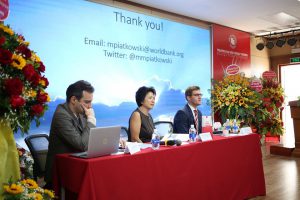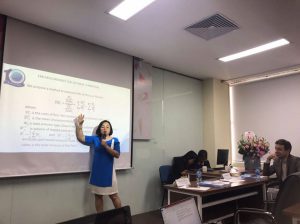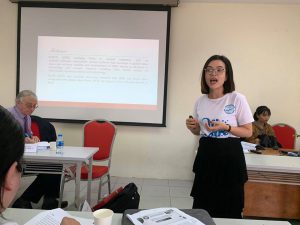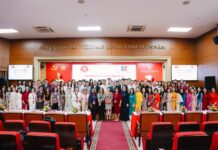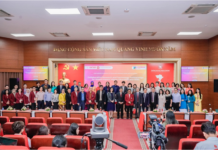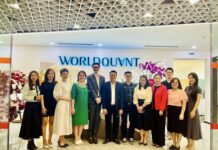In the context of globalization undergoing significant changes with both positive factors (e.g. modern technology) intertwined with negative factors (e.g. climate change), the development of an economy towards sustainability and inclusivity has become more imperative than ever. The Lima Declaration of 2013 by the United Nations provided a vision and specific actions for the industrialization process associated with sustainable and inclusive development. In reality, countries pursuing traditional industrialization policies, especially developing nations, have shown initial policy shifts to adapt to new circumstances.
Recognizing the importance of this issue for the Vietnamese economy, on November 11th, 2019, Foreign Trade University organized a conference on “Industrialization with Inclusive and Sustainable Development.” The conference was held to celebrate the 10th-anniversary celebration of the establishment of the Faculty of International Economics. As a result, it received significant attention from economists both within and outside the university, especially from the academic staff of the Faculty of International Economics (who contributed to over 90% of the presentations at the conference).
The conference was organized into two sessions: the plenary session took place in D201 in the morning, and parallel sessions were held simultaneously in four seminar rooms on the 11th floor of Building A in the afternoon. During the plenary session, professors from Italy, Poland, Canada, and France presented the basic theoretical framework of industrial development policies and the necessity to change traditional industrial policies to adapt to the new context of the economy.The professors and guest speakers unanimously agreed that in order for industrialization to remain a growth driver for the economy in the new context, it must be planned in a sustainable and inclusive manner, with a particular focus on developing human resources. However, in the context of the Fourth Industrial Revolution (Industry 4.0), the demands for human resources in industrialization are also very high. This poses significant challenges for all countries, especially developing ones like Vietnam, as they transition to parallel sessions in the afternoon.
The presentations at the conference were divided into four thematic groups, namely: session 1 on “Enhancing Human Resources” chaired by Prof. Tran Thi Anh Dao, senior researcher at IRASEC-USR; session 2 on “Creating Shared Prosperity” chaired by Prof. Yves Tiberghien from the University of British Columbia; session 3 on “Safeguarding the Environment” chaired by Assoc. Prof. Dr. Tu Thuy Anh, Dean of Faculty of International Economics; and session 4 on “Advancing Economic Competitiveness” chaired by Prof. Robert Boyer from the Institute of the Americas, France. All four discussion sessions focused on key topics related to industrialization in the context of sustainability and inclusivity: human resources, the environment, institutional quality, and the competitive capacity of the economy. The parallel sessions not only attracted the participation of scientists and academic staff from the Faculty of International Economics and other units within the University but also garnered the attention of students, demonstrating the practicality of the conference’s themes and the level of public interest in sustainable and inclusive development.
The conference was part of a series of activities commemorating the 10th anniversary of the establishment of the Faculty of International Economics, highlighting the faculty’s strengths in scientific research and international cooperation. The conference concluded successfully, opening up new research directions in the field of policy planning for scientists, academic staff, and students.
Some photos of the conference

